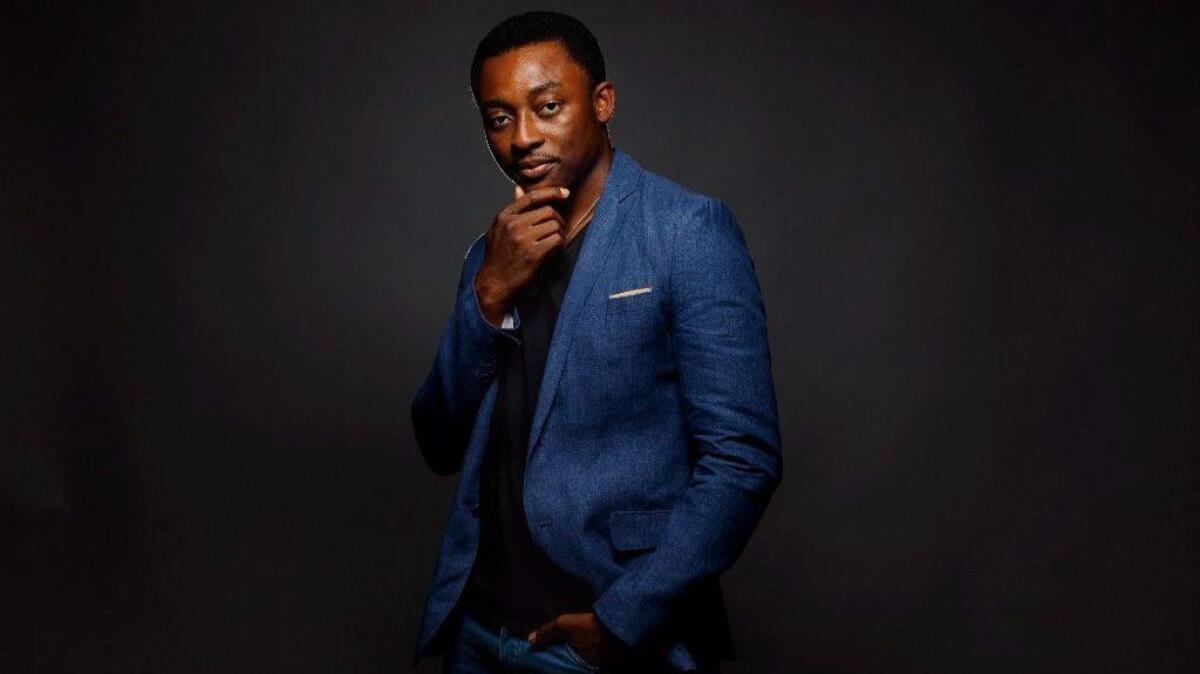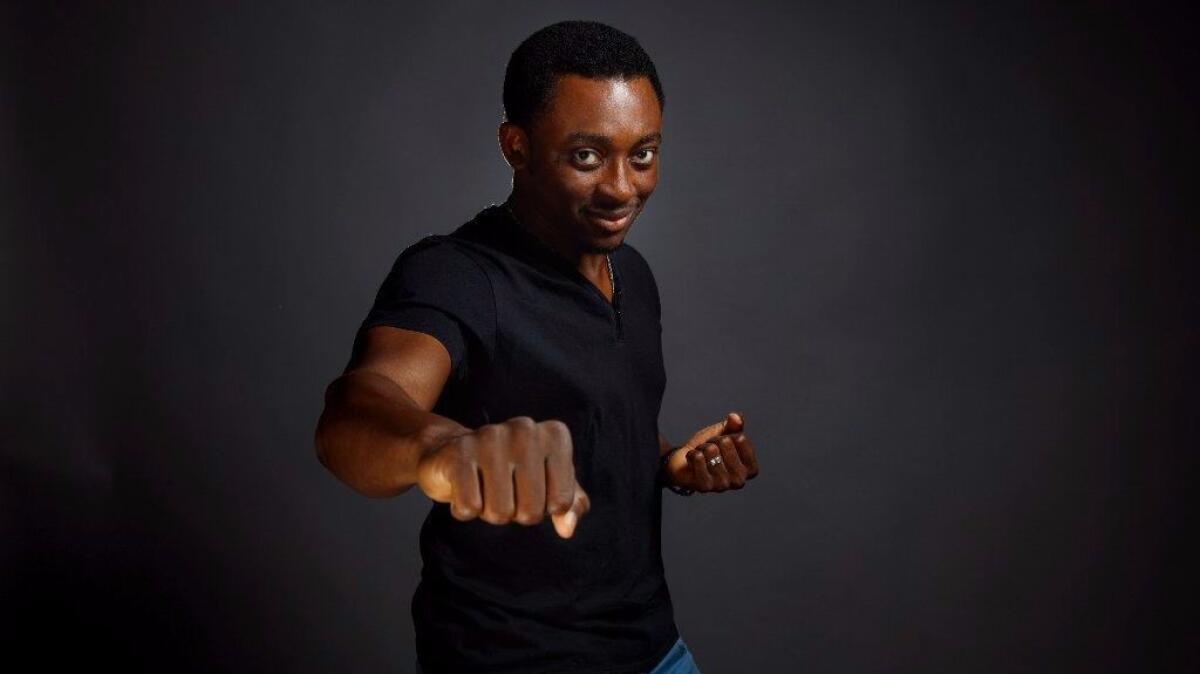Q&A: Actor Bambadjan Bamba comes out as undocumented: ‘We just can’t be scared anymore.’

In a video by the organization Define American, actor Bambadjan Bamba comes out as an undocumented immigrant.
- Share via
Bambadjan Bamba has only the fondest memories of growing up in the African country of Cote D'Ivoire. But in 1993, after that nation’s first president, Félix Houphouët-Boigny, died and it became politically unstable, Bamba’s family fled to the United States for protection. At 10, America became his new home.
Twenty-five years later, however, the actor perhaps best known for his recurring role on NBC’s “The Good Place” doesn’t quite feel like an American. Sure, he’s perfected the accent and erased every hint of foreign-born-ness from his speech. But since high school, he’s carried around a secret burden he’s ready to reveal: He’s undocumented.
Bamba is one of the estimated 11 million undocumented Americans living in the United States, according to Pew research. He’s told very few people of his citizenship status — until now.
America really has to stand for immigrants now.
— Bambadjan Bamba
Motivated by the Trump administration’s efforts to rescind the Deferrred Action for Childhood Arrivals program, known as DACA, the Obama-era policy that protects the children of immigrants who didn’t enter the country legally, the “Grey’s Anatomy,” “Suicide Squad” and “Black Panther” actor is breaking his silence.
“Immigrants are not criminals,” said Bamba, 35. “We're not here to take away your jobs. We're here to give back. We're not just Mexicans or Latino. We're black, too. We're from the Middle East, from Asia, too. We're your neighbors, your doctors, the teachers of your children, and sometimes we're on TV in your home, characters that you love. We're just one of you.
“The only difference is [that you have] a certain piece of paper that's supposed to allow you to navigate freely in the country.”
In an exclusive interview, The Times spoke with Bamba about “overcoming fear,” how his citizenship status affects his job and what he hopes audiences will take away from his coming out.

What made you decide that you wanted to come out as undocumented?
Ultimately, I really felt moved in my spirit. I felt like God was telling me, "This is your time to do it. You have to do it." I look at my daughter and I'm like, "If I don't do it, and DACA gets canceled, I could be separated [from her]." We just don't know what's going to happen and I'd rather go out fighting.
All these kids that have so much less than I do, they're standing up. They're sleeping in front of the White House or in front of their congressman's office. I'm sitting here being scared. But we're done with fear. We're here to stay. Let's push. Let's fight, because nothing is going to be given for free.
At what point did you find out you were undocumented?
My whole childhood was, “Hey, we’re in America. We’re trying to get asylum. There's a war in Africa." It wasn't until I started applying for college that I realized that I couldn't get financial aid. I had to have a conversation with my parents, and they're like, "Oh yeah… The asylum case didn't work out, but whatever you want to do, we will support.”
I got into [the Conservatory of Film and Dramatic Arts] and they helped me pay for it. I drove yellow cabs in New York City to make the tuition and just kind of did what needed to be done. I just always knew that [acting] is what I was called to do, someway somehow. I figured if I kept working hard at it, if I keep doing the right thing, if I'm super successful, then I'll become a citizen eventually. That hasn't happened yet.
The Obama administration established DACA in 2012 for immigrants like yourself. What do you remember about that moment?
My whole adult life has just been this limbo with immigration. You hear on the news one day about immigration, “Bush might pass something." Then, we [were] all holding our hearts. We're all praying. We're all fasting. We're all trying to help any way we can. Then nothing happens. You feel this despair like, "Oh my God. We're in this again." But you keep going.
Then, Obama promises that in his first year of office, he's going to do something, and then he doesn't. There were really some brave undocumented immigrants that just held him to task and really forced him to sign that executive action. I was supporting it in the way that I could, but there's always this shadow of fear like, "Oh my God. If I come out [as undocumented], what can happen? I may never work in Hollywood again. I could be sent back home and there's a war!" There's always this fear, this balance.
What went through your mind when President Trump announced his intentions to rescind DACA?
“We're back here again.” [Being undocumented] is like this thing you want to forget, but you keep getting reminded of. And it's not just a simple reminder; you're having nightmares. I have friends who had nervous breakdowns the day before they're supposed to go see a judge. There's a lot of fear around the issue because they criminalize you. You're just here to go to school. Your parents can't pay for the school. Next thing you know, you're undocumented, and you're a criminal, and you're sent to jail. It's just this spiral.
It's a little different when you're black and you're an immigrant because the cop doesn't care that you're an immigrant at first. You're just black. You're dealing with all those issues. When he finds out you're an immigrant, he's like, "Oh, okay. I got you now."

The face of immigration is often Latino, but according to a NYU School of Law report, there are about 5 million foreign-born black people in the U.S., 3.7 million of which aren’t citizens.
I speak with an American accent now because of the story I told you of my childhood. I'm an actor, and it works when you have both accents. No one imagines, no one thinks in their wildest dreams that I'm undocumented. There's also a lot of resources and organizations set up for Latino immigrants, because they're the majority. Black immigrants really don't have that much support... and for people from the Caribbean or Africa, there's a shame culture around being undocumented. No one even wants to come out and talk about it.
Since the new administration, people are scared to go to the little Jamaican restaurant because there are raids. They're scared to take a certain street because of raids. There's all this fear that's being perpetuated. We just can't be scared anymore.
How has your citizenship status affected any type of opportunities for you in Hollywood?
For one, a lot of work is in Canada or otherwise outside of America. I've had auditions before… and imagine you're in the room trying to book a role, but in the back of your mind you're like, "Man, if I book this, how am I going to travel? How am I going to come back?" It's like you're always stuck with this decision that you kind of have to make. My biggest fear is you're on set shooting, and they come out, "Hey, stop shooting. Stop shooting. He doesn't have papers." That happened to a friend of mine when he did have papers.
Sounds like a perpetually anxious situation to be in…
A job that I just did, we shot on Friday, shot the entire scene. It was beautiful and the director liked me. Everything was great. On Saturday, they're like, "We don't understand this paper. Where's your visa?" I'm like, "I don't have a visa. I'm DACA." "Well, what's DACA?"
You try to break it down to them. They're freaking out, calling [my manager] like, "Oh my God. I'm going to lose my job. I'm going to get fired because he’s already on camera…”
It's such a controversial issue, but people know nothing about immigration. Hopefully coming out, especially to Hollywood, would help demystify it a little bit. There's so many people in Hollywood who are immigrants. I don't know how Hollywood would function without immigrants. Again, I'm coming out to say, "Hey, my colleagues, my friends, it's great to say ‘I'm with DACA. I'm with the Dreamers,’ but we need more concrete action. Call your representatives." America really has to stand for immigrants now.
I'm surprised — but also, not really — by that because we often look at Hollywood as being this very liberal place. Celebrities are literally out here wearing “We Are All Dreamers” shirts. How does that make you feel as someone who's been in this industry for over 10 years now?
Honestly, in the heart of their hearts, I know that they're supportive of immigrants. It’s just frustrating when people are scared when they see these documents. Yes, the immigration system is complicated, but people are here working legally. Booking the job is really the hardest part, so your documentation afterwards should be simple…
What do you hope audiences take away from now knowing your story?
At the bottom line, this is an immigrant nation. It was founded by immigrants. America said, "Bring me your poor. Bring me your downtrodden. Bring me all those who are being persecuted, and they will have a safe place." That's still valid today even though the immigrants that are coming are not all from Europe anymore. I believe America has a responsibility to those words and those ideals.
Get your life! Follow me on Twitter (@TrevellAnderson) or email me: trevell.anderson@latimes.com.
Only good movies
Get the Indie Focus newsletter, Mark Olsen's weekly guide to the world of cinema.
You may occasionally receive promotional content from the Los Angeles Times.








